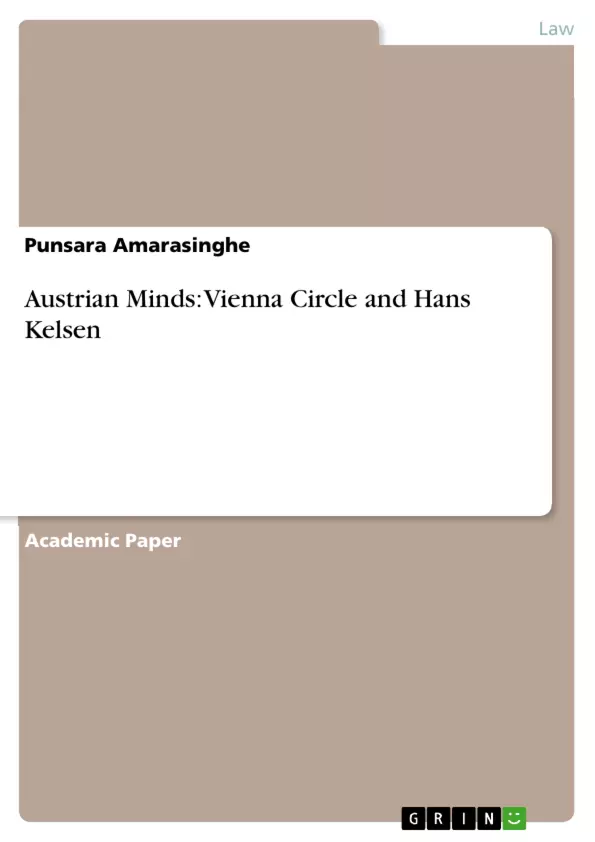This Article seeks to explain Kelson’s pure theory of law and his whole contribution to legal positivism was influenced and bolstered by his early stay in Vienna, even though the foundational stone laid by Kelsen on legal positivism is clearly distinguished from logical positivism propounded by the pioneers of Vienna circle, in this article I argue the intellectual uplifting Kelsen underwent during the youth he spent in Vienna had left a hallmark in his thoughts. Furthermore this article illustrates how both logical positivism and legal positivism grew parallel in a same time period during two great wars.
Central argument I seek to explain in this article is to demonstrate Hans Kelsen as a legal modernist and how Vienna circle made impacts upon his thoughts.
Inhaltsverzeichnis (Table of Contents)
- Abstract
- Introduction
- Kelsen and "Grundnorm"
- Kelsen's association with Vienna Circle
Zielsetzung und Themenschwerpunkte (Objectives and Key Themes)
This article aims to explain Hans Kelsen's pure theory of law and demonstrate how his stay in Vienna influenced his work. It explores the connection between Kelsen's legal positivism and the logical positivism of the Vienna Circle, arguing that both movements developed in parallel during a period of significant intellectual and societal change.
- The influence of the Vienna Circle on Kelsen's legal positivism
- The development of both logical positivism and legal positivism during the 20th century
- The impact of empiricism on legal theory
- Kelsen's "pure theory of law" and its relationship to Kant's philosophy
- The role of modernism in shaping the intellectual landscape of Vienna during the early 20th century
Zusammenfassung der Kapitel (Chapter Summaries)
- Abstract: This section introduces the main argument of the article, focusing on the connection between Kelsen's pure theory of law and his time spent in Vienna. It highlights the influence of the Vienna Circle on Kelsen's work, while acknowledging the distinct differences between logical positivism and legal positivism.
- Introduction: This chapter provides a general overview of the topic, tracing the historical context and intellectual climate in Vienna during the early 20th century. It explores the emergence of the Vienna Circle as a new academic movement and introduces the key concepts of logical positivism, empiricism, and the influence of 20th-century philosopher Wittgenstein.
- Kelsen and "Grundnorm": This section delves into Kelsen's "pure theory of law," discussing his concept of the "Grundnorm" and its relation to the hierarchy of legal norms. It contrasts Kelsen's approach to law with that of John Austin, emphasizing Kelsen's focus on the systematic nature of law.
Schlüsselwörter (Keywords)
This article examines the interplay between legal positivism, logical positivism, the Vienna Circle, Hans Kelsen, pure theory of law, "Grundnorm", empiricism, modernism, and the intellectual landscape of Vienna during the early 20th century. It focuses on the influence of these concepts and movements on Kelsen's legal philosophy and his contribution to jurisprudence.
- Quote paper
- Punsara Amarasinghe (Author), 2018, Austrian Minds: Vienna Circle and Hans Kelsen, Munich, GRIN Verlag, https://www.grin.com/document/419401



